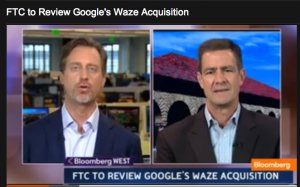 Waze is turning out to be the media gift that keeps on giving…I was asked to comment on Bloomberg West about the rumored FTC review of Google’s acquisition of Waze; my fourth Waze related interview. Kinda looking forward to talking about something else. The interview is linked here.
Waze is turning out to be the media gift that keeps on giving…I was asked to comment on Bloomberg West about the rumored FTC review of Google’s acquisition of Waze; my fourth Waze related interview. Kinda looking forward to talking about something else. The interview is linked here.
As the saying goes, I am not an anti-trust expert; I just play one on TV. I can’t comment on what is or isn’t an anti-trust violation from a legal perspective. From a practical perspective though, I am not convinced that the Waze acquisition turns Google Maps into more of a juggernaut than it already was. Said another way (and as outlined in my last post), Google was already the mapping superpower; adding Waze strengthen that but the fact was pre-existing.
A lot of the anti-trust talk seems to have been started by comments by Waze CEO Noam Bardin at an AllThingsD conference where he said:
“We feel that we’re the only reasonable competition to [Google] in this market of creating maps that are really geared for mobile, for real-time, for consumers — for the new world that we’re moving into.”
Those words are more aspirational than factual.
Removing Waze from the field does not eliminate competition for Google. What it does do is to take a creative alternative off the market; someone who was rethinking the game and aggressively growing a map product that wasn’t a carbon copy of Google but something different, with a different value for the user. Whether Waze could have built themselves into a big competitor or become the baseline for some other acquirer will never be known but that was the potential of Waze.
There are plenty of alternatives, just not many creative alternatives. And that creativity is what’s going to be needed to push Google in this market.

